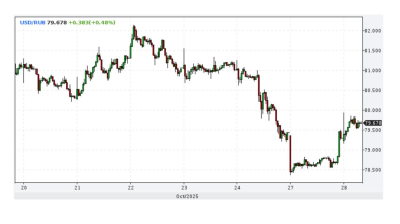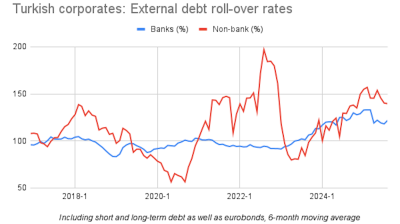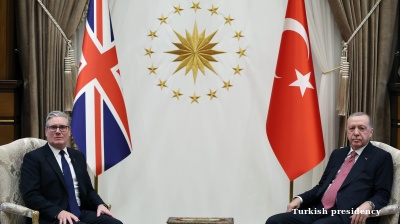Turkey’s central bank on March 7 kept its main interest rates unchanged despite its need to fight stubborn double-digit inflation and core inflation that remains elevated. To no surprise among analysts, the regulator, also trying to get to grips with the fluctuating Turkish lira (TRY), said in a statement that it was keeping the one-week repo (8%), overnight lending (9.25%) and borrowing (7.25%) rates on hold.
The central bank’s monetary policy committee (MPC) also opted to keep its late liquidity window lending rate unchanged at 12.75%.
The TRY lost 0.20% d/d against the USD to trade at 3.8010 as of 14:15 local time on March 7 while the benchmark BIST-100 was down 0.36% to 116,290.
Capital Economics responded to the rates decision by noting that the central bank’s explanation of its monetary stance was “accompanied by a statement suggesting that policymakers are increasingly concerned by high inflation and unanchored inflation expectations. This supports our view that the MPC will keep its rates at current high levels over the course of this year, even as inflation subsides”.
William Jackson, senior emerging markets economist at Capital Economics, said: "The statement struck the same hawkish language as that used at the past few MPC meetings, and added a new line saying that ‘underlying trend indicators display inertia and core inflation remains elevated’. To us, that suggests that the MPC is increasingly concerned that, even though headline inflation has fallen quite sharply in recent months, core inflation has been slow to come down. The reference to ‘inertia’ suggests that policymakers are worried that high inflation rates are also pushing up inflation expectations."
Jackson anticipated that the central bank’s average cost of liquidity provision – which he said was the best measure of overall monetary conditions – would remain at its current level of 12.75% over the course of this year.
Timothy Ash, senior emerging markets sovereign strategist at BlueBay Asset Management, said of the rates decision: “Clearly [the central bank] doesn't want to rock the boat; as long as the TRY is reasonably stable, they will not do very much, and the sense is they are happy as long as inflation is within reach of single digits.”
The MPC itself said in a press release that a tight stance in monetary policy would be maintained decisively until the inflation outlook displays a significant improvement, independent of base effects and temporary factors, and becomes consistent with the targets.
Turkey’s annual consumer price inflation came in at 10.26% for February, the lowest level recorded since July last year but a disappointment to analysts who hoped for something more impressive.
Consumer prices increased by 0.73% m/m last month, beating even the higher 0.33%-0.65% band of market expectation determined by a Reuters poll.
Annual inflation eased from the 14-year high of 12.98% in November last year to 11.92% in December due to base effects. In the first two months of 2018, the base effects continued.
Volatile food prices rose by 2.24% m/m, bringing annual food inflation to 10.27% in February from 8.76% in January.
The annual rise in the C-index, one of the central bank’s favourite core inflation indicators, slowed to 11.94% in February from 12.18% in January.
The C-index touched 12.30% in December, the highest level posted since January 2004 when the index was first compiled.
TUIK also reported on March 5 that domestic producer prices rose 2.68% in February after increasing 0.99% m/m in the previous month. This brought the annual increase to 13.71% in February from 12.14% in January, the lowest level since December 2016.
Annual producer price inflation hit 17.30% last November, the highest level since July 2008.
Turkish President Tayyip Erdogan on February 1 met central bank governor Murat Cetinkaya and state bank officials to discuss steps to reduce interest rates and attract investment.
The central bank raised its end-2018 consumer price inflation forecast to 7.9% in January from the previous estimate of 7%.
S&P Global Ratings could downgrade Turkey if monetary policy proves inadequate to curb double-digit inflation and currency pressures, the rating agency said on February 23 when it affirmed its unsolicited 'BB/B' foreign currency long- and short-term sovereign credit ratings and its unsolicited 'BB+/B' local currency long- and short-term sovereign credit ratings on Turkey with negative outlook.
S&P also said the picture could worsen due to Turkey's reliance on volatile portfolio inflows to finance its sizable current account deficit. “Additional currency weakness could, in our view, lead to a deterioration of asset quality in the financial sector, given the substantial share of foreign currency claims on residents by Turkish banks,” the rating agency added.
Moody’s expects the inflation rate will rise to 12.2% at end-2018 from 11.9% at end-2017.
Expectations for Turkey's end-2018 inflation very slightly declined to 9.52% in February from 9.55% in January, the central bank’s regular survey of businesses and analysts showed on February 15.
Data

Ruble strengthens as sanctioned oil companies repatriate cash
The Russian ruble strengthened after the Trump administration imposed oil sanctions on Russia’s leading oil companies, extending a rally that began after the Biden administration imposed oil sanctions on Russia in January.

Russia's central bank cuts rates by 50bp to 16.5%
The Central Bank of Russia (CBR) cut rates by 50bp on October 24 to 16.5% in an effort to boost flagging growth despite fears of a revival of inflationary pressure due to an upcoming two percentage point hike in the planned VAT rates.

Ukraine's trade deficit doubles to $42bn putting new pressure on an already strained economy
Ukraine’s trade deficit has doubled to $42bn as exports fall and imports balloon. The balance of payments deficit is starting to turn into a serious problem that could undermine the country’s macroeconomic stability.

BYD surpasses Tesla to become EV market leader – Statista
While Chinese manufacturer BYD already pulled ahead of Tesla in production volume last year, with 1,777,965 battery electric vehicles (BEV) produced in 2024 (4,500 more than Tesla), the American manufacturer remained ahead in sales.


_Cropped_1761809941.jpg)

